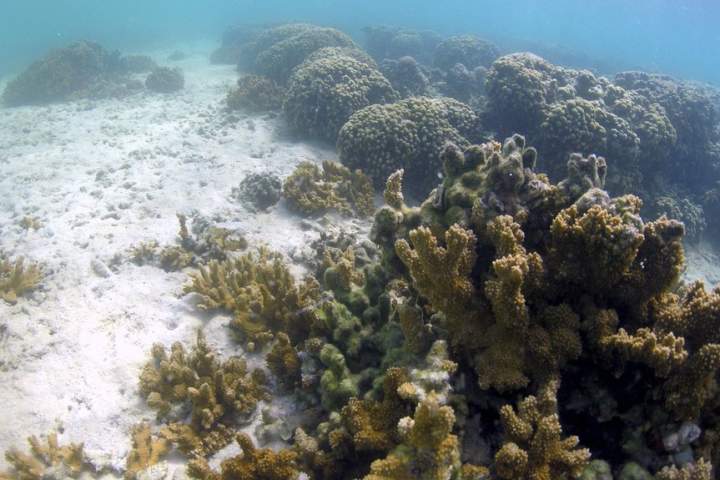Science
Scientists Warn Coral Reefs Near Irreversible Collapse Due to Climate Change

Global warming is accelerating at an alarming rate, leading scientists to declare that the world’s coral reefs are now on the brink of an irreversible die-off. This stark warning was issued in the Global Tipping Points report on Monday, which synthesizes research from 160 scientists worldwide and identifies critical thresholds in the climate-driven collapse of ecosystems. The report arrives just weeks before the COP30 climate summit, scheduled to take place near the Amazon rainforest in Brazil.
The Amazon, a vital carbon sink, faces a similar risk of collapse if global temperatures exceed an increase of just 1.5 degrees Celsius. The report has revised down the previously estimated threshold for this crucial ecosystem. Another significant concern highlighted is the potential disruption to the Atlantic Meridional Overturning Circulation (AMOC), a major ocean current that plays a key role in regulating winter temperatures in northern Europe.
Tim Lenton, an environmental scientist at the University of Exeter and lead author of the report, emphasized the urgent need for action. “Change is happening fast now, tragically, in parts of the climate, the biosphere,” he stated. Lenton did note some positive developments, particularly in the global transition away from fossil fuels, citing data from the nonprofit think tank Ember. For the first time this year, renewable energy sources generated more electricity than coal.
“Nobody wants to be just traumatized and disempowered,” Lenton said. “We still have some agency.” He urged countries attending November’s COP30 to focus on reducing carbon emissions that contribute to climate warming.
The speed of changes occurring in nature has taken scientists by surprise. Average global temperatures have already risen by 1.3-1.4 degrees Celsius above preindustrial levels, according to data from U.N. and EU science agencies. The last two years have been the warmest on record, with marine heatwaves affecting 84 percent of the world’s coral reefs, leading to widespread bleaching and mortality.
Coral reefs, which support about a quarter of marine life, require a significant reduction in global temperatures to recover. The scientific consensus suggests that to facilitate recovery, global efforts must aim to lower temperatures back to just 1 degree Celsius above preindustrial averages.
Pep Canadell, a senior scientist at the CSIRO Climate Science Centre in Australia, remarked, “The new report makes clear that each year there is an increase in the scope and magnitude of the negative impacts of climate change.” Current trajectories indicate that the world is on track for approximately 3.1 degrees Celsius of warming this century based on existing national policies.
As the COP30 summit approaches, the call for urgent and effective climate action grows ever more critical. The future of not only coral reefs but global ecosystems hangs in the balance, underscoring the necessity for immediate international cooperation and commitment to combat climate change.
-

 Science2 months ago
Science2 months agoToyoake City Proposes Daily Two-Hour Smartphone Use Limit
-

 Health2 months ago
Health2 months agoB.C. Review Reveals Urgent Need for Rare-Disease Drug Reforms
-

 Top Stories2 months ago
Top Stories2 months agoPedestrian Fatally Injured in Esquimalt Collision on August 14
-

 Technology2 months ago
Technology2 months agoDark Adventure Game “Bye Sweet Carole” Set for October Release
-

 World2 months ago
World2 months agoJimmy Lai’s Defense Challenges Charges Under National Security Law
-

 Technology2 months ago
Technology2 months agoKonami Revives Iconic Metal Gear Solid Delta Ahead of Release
-

 Technology2 months ago
Technology2 months agoSnapmaker U1 Color 3D Printer Redefines Speed and Sustainability
-

 Technology2 months ago
Technology2 months agoAION Folding Knife: Redefining EDC Design with Premium Materials
-

 Business2 months ago
Business2 months agoGordon Murray Automotive Unveils S1 LM and Le Mans GTR at Monterey
-

 Technology2 months ago
Technology2 months agoSolve Today’s Wordle Challenge: Hints and Answer for August 19
-

 Lifestyle2 months ago
Lifestyle2 months agoVictoria’s Pop-Up Shop Shines Light on B.C.’s Wolf Cull
-

 Technology2 months ago
Technology2 months agoApple Expands Self-Service Repair Program to Canada









